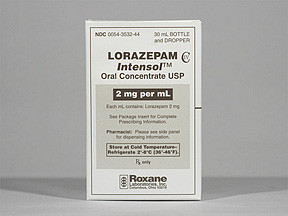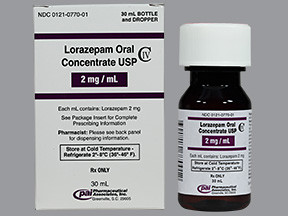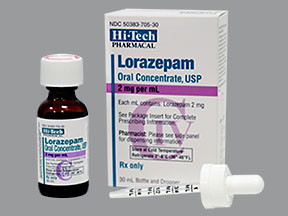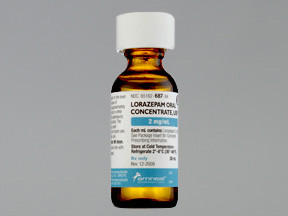LORAZEPAM CONCENTRATE - ORAL
PHONETIC PRONUNCIATION: (lor-AYE-zeh-pam)
COMMON BRAND NAME(S): Lorazepam Intensol
GENERIC NAME(S): lorazepam
Uses
USES: This medication is used to treat anxiety. Lorazepam belongs to a class of drugs known as benzodiazepines which act on the brain and nerves (central nervous system) to produce a calming effect. This drug works by enhancing the effects of a certain natural chemical in the body (GABA).
How to use LORAZEPAM CONCENTRATE - ORAL
HOW TO USE: Read the Medication Guide provided by your pharmacist before you start using lorazepam and each time you get a refill. If you have any questions, ask your doctor or pharmacist. This medication is a high-strength concentrated liquid. Use the provided medicine dropper to carefully measure the exact amount of medication prescribed by your doctor. You may mix the measured dose with a small amount of juice, water, soda, applesauce or pudding. Stir in one dose and mix gently for a few seconds. After preparing one dose, drink or eat the entire mixture right away. Do not prepare a supply for future use. Ask your pharmacist if you have any questions. The dosage is based on your medical condition, age, and response to treatment. If directed by your doctor, use this medication regularly in order to get the most benefit from it. To help you remember, use it at the same time(s) each day. This medication may cause withdrawal reactions, especially if it has been used regularly for a long time or in high doses (more than 1-4 weeks) or if you have a history of alcoholism, drug abuse, or personality disorder. Withdrawal symptoms (such as seizures, trouble sleeping, mental/mood changes, nausea, vomiting, diarrhea, loss of appetite, stomach pain, hallucinations, numbness/tingling of arms and legs, muscle pain, fast heartbeat, short-term memory loss, very high fever, and increased reactions to noise/touch/light,) may occur if you suddenly stop using this medication. To prevent withdrawal reactions, your doctor may reduce your dose gradually. Report any withdrawal reactions right away. Though it helps many people, this medication may sometimes cause addiction. This risk may be higher if you have a substance use disorder (such as overuse of or addiction to drugs/alcohol). Take this medication exactly as prescribed to lower the risk of addiction. Ask your doctor or pharmacist for more details. Do not suddenly stop using this drug without consulting your doctor. Some conditions may become worse when this drug is abruptly stopped. Your dose may need to be gradually decreased. When this medication is used for a long time, it may not work as well. Talk with your doctor if this medication stops working well. Tell your doctor if your condition persists or worsens.
Side Effects
Precautions
Interactions
Overdose
Images
Reviews
Faq for LORAZEPAM CONCENTRATE - ORAL
Lorazepam Concentrate - Oral is used to treat anxiety disorders and certain types of seizures. It is also used for preoperative sedation and to relieve symptoms of alcohol withdrawal.
Take this medication by mouth as directed by your doctor. The dosage is based on your medical condition, response to treatment, and age. Do not increase your dose or use it more frequently or for longer than prescribed.
Common side effects may include drowsiness, dizziness, blurred vision, nausea, or constipation. If any of these effects persist or worsen, inform your doctor promptly.
Yes, this medication can be habit-forming, especially if used for a long time or in high doses. Do not suddenly stop using Lorazepam without consulting your doctor, as withdrawal symptoms may occur.
Lorazepam should not be used if you have a known allergy to it or similar drugs. It should also be used with caution in patients with a history of substance abuse or addiction. This medication may impair your thinking or reactions, so avoid activities that require mental alertness until you know how it affects you.
If you miss a dose, take it as soon as you remember. However, if it is close to the time of your next dose, skip the missed dose and resume your regular dosing schedule. Do not double the dose to catch up.
It is not recommended to use Lorazepam Concentrate - Oral during pregnancy, especially during the first trimester, as it may cause harm to the unborn baby. Consult your doctor for the potential risks and benefits if you are pregnant or planning to become pregnant.
This medication is not recommended for use in children younger than 12 years unless directed by a doctor. The dosage and safety for pediatric use should be determined by a healthcare professional.
Lorazepam may interact with other medications, including certain antidepressants, anticonvulsants, and sedatives. Inform your doctor about all the medications you are currently taking to avoid any potential drug interactions.
Warning
WARNING: Taking lorazepam with opioid medications (such as codeine, hydrocodone) may increase your risk of very serious side effects, including death. To lower your risk, your doctor should have you take the smallest dose of lorazepam that works, and take it for the shortest possible time. Get medical help right away if any of these very serious side effects occur: slow/shallow breathing, unusual lightheadedness, severe drowsiness/dizziness, difficulty waking up.
Disclaimer
IMPORTANT: HOW TO USE THIS INFORMATION: This is a summary and does NOT have all possible information about this product. This information does not assure that this product is safe, effective, or appropriate for you. This information is not individual medical advice and does not substitute for the advice of your health care professional. Always ask your health care professional for complete information about this product and your specific health needs.




No Reviews Yet